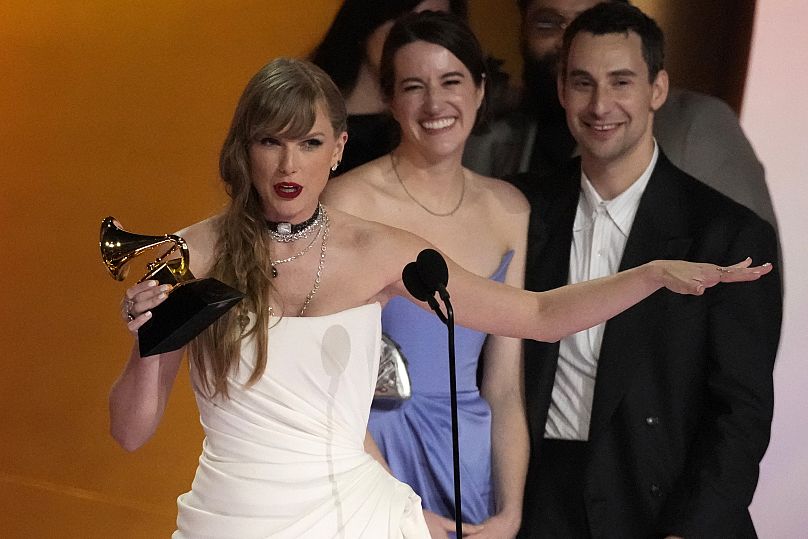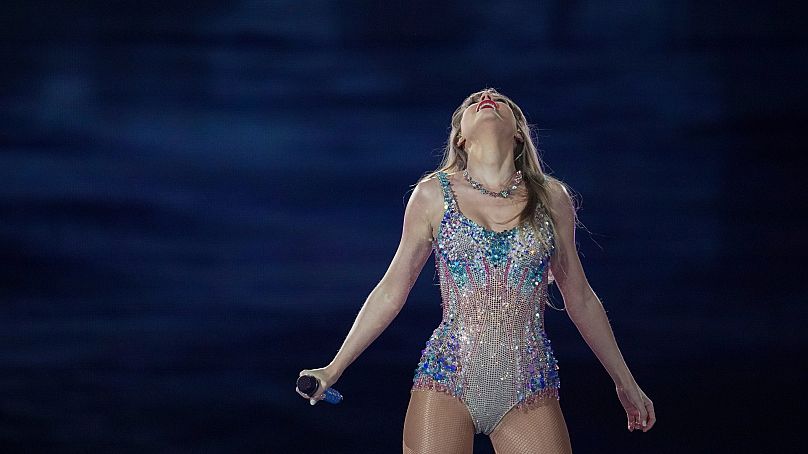Swift is at the top of her game critically and commercially, but is she now more corporation than artist?
It’s been a busy week for the world’s biggest popstar.
 ADVERTISEMENT
ADVERTISEMENT
 ADVERTISEMENT
ADVERTISEMENT
At the Grammy Awards, Taylor Swift became the first artist to win the Album of the Year award four times when she won for her 2022 album ‘Midnights’. As she received the historic award, she announced her 11th album ‘The Tortured Poets Department’ which is set for release in April this year.
Swift’s Grammy moment seemed to be the apotheosis of a year spent entirely in ascent.
In 2023, Swift was the Time Person of the Year, released two more re-recordings of earlier albums, performed the highest-grossing tour of all time, and became a billionaire.
She also made Euronews Culture's Top Person of the Year for Music. Dwarfs the rest, right?
Yet on social media, there’s a distinct smell in the air. Whereas criticism of one of the world’s biggest-selling artists has previously been quashed by accusations of misogyny or plain mean-spiritedness, suddenly my timelines were filled with complaints.
The first was quite straightforward. Swift’s Grammy win may have been positively significant to her personally, but it was symbolic to many of the continued erasure of Black – and particularly Black female – artists. A Black woman hasn’t won album of the year since Ms. Lauryn Hill did in 1999. Of the nominees, SZA’s ‘SOS’ is certainly a more interesting album than Swift’s ‘Midnights’ and Jay-Z rightly alluded to the continued oversight of his wife Beyoncé’s output.
While the Grammys may have rankled some, most are aware it’s a naval-gazing industry award that has never been that representative of quality. In other words, it’s not that important. The real crux of the backlash that Swift is now facing seems to be pointed more generally at her sudden standing as a cultural behemoth.
Pre-2020, Swift was a mega-popstar. After making the transition from country music starlet to full-on pop sensation, most typified by her hit-packed 2014 album ‘1989’, and her successful transcendence of the PR-nightmare incident when Ye (formerly Kanye West) stole the mic from her at the 2009 MTV Awards, Swift was huge. Her 2019 album ‘Lover’ was an improvement, if not itself great, on the underwhelming ‘Reputation’ and her dedicated fan base was preparing to amass for its respective concert tour.
Then came the pandemic. Swift released two surprise albums ‘Folkmore’ and ‘Evermore’. Paired back to an acoustic sound, she reignited what her OG fans loved. She also started rerecording and releasing earlier albums that her ex-manager Scooter Braun owned the rights to.
In the four years since the world changed, Swift has released three new studio albums and four recorded albums. When ‘The Tortured Poets Department’ releases, it’ll signify a period where the world has never gone more than six months without a new Taylor Swift album to buy.
Fans should love this. Many do. But there’s also something amiss. As Swift’s net worth crept over the billion dollar line, it’s been hard not to notice that increasingly she has started to feel more like a corporation than a real artist.
While the first few rerecordings could be viewed through the feminist lens of an artist taking back control of her music, the ceaseless bombardement of albums for fans to BUY MORE, is more akin to how products are marketed.
That’s not even to get started with the endless variations of the albums she has released, all necessary for fans to improve their chances of getting elusive tickets for one of the most expensive tours of all time for fans. You don’t get to be that high-grossing without someone footing the bill.
Then there’s the matter of Swift’s air travel. Through trackers on X, fans have noticed the musician is in regular use of private jets to escort her criminally short distances at a great cost to the environment.
In her favour, a recent list didn’t put her in the top 10 users of private jets with Travis Scott at number one. However, Coldplay have structured their tours around reducing air travel, so why can’t she do the same? Added to that, Swift’s legal team have threatened the owner of the X account tracking her flights this week after selling one of her private jets.
Yet the jet-setting isn’t really what’s turned the tide.
The real thing is the schism at the heart of what Swifties have always appreciated about her and the actual reality of the billionaire.
To her fans, Swift is an artist who luxuriates in the emotions of girlhood, principally heartbreak, loneliness and aspiration. But having now spent nearly 20 years on that subject, the lack of growth is becoming readily apparent.
It’s been rightly pointed out that 34-year-old Swift has maintained her girly image over the woman she actually is. A suggestion especially stark in comparison with Adele, who’s only a year older and has had a similar career span. And while other artists have also been willing to make political statements, beside a late-career anti-Trump moment, Swift is notably silent.
While similar popstars like Adele and Beyoncé have matured and grown their artistry to release complex music that challenges audiences sonically and emotionally, Swift seems trapped in this more juvenile young girl aesthetic.
Why? It’s simple. It sells better.
At the core of every decision Swift seems to make, there is one single motivating factor. Profit. She’s an expert at it. From moments like releasing a single with Ice Spice days after her then-BF Matty Healy was accused of racism for mocking her to the announcement of her 11th album, nothing Swift does seems to be driven by artistic intent first and foremost.
Which finally leads us to that 11th album. ‘ The Tortured Poets Department ’ would sound like a self-deprecating joke if Swift wasn’t so consistently sincere. Instead, it reads as one more entry into her pantheon of goods for other young girls-like-her to shell out their cash for.
You can’t make a billion dollars by being a tortured poet, but you can do it by pretending you are.












